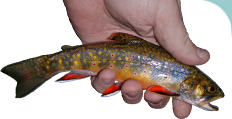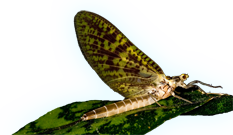Blog & Latest Updates
Fly Fishing Articles
Insects by Common Name


> > Dark Sulphur
The Specimen
The Discussion
| Martinlf | August 17th, 2007, 9:38 am | |
Moderator Palmyra PAPosts: 3233 | Would some of the entomologists on the site comment on the color of this sulphur dun? I was scanning through the images, planning on doing some dyeing, and this one caught my attention as it is so much darker than others. | |
| "He spread them a yard and a half. 'And every one that got away is this big.'" --Fred Chappell | ||
| Wiflyfisher | August 17th, 2007, 10:24 am | |
| Wisconsin Posts: 663 | Louis, I would suspect the little bugger was in the sun too long and got a bad sunburn. | |
| John S. https://WiFlyFisher.com | ||
| CharlieSawd | May 22nd, 2009, 9:07 pm | |
| St. Michael, Minnesota Posts: 26 | Jason, Is this not subvaria? | |
| Charlie Sawdey www.driftlessflybox.com | ||
| Konchu | May 23rd, 2009, 11:25 am | |
Site Editor IndianaPosts: 505 | that one might be subvaria rather than invaria, but it is sometimes hard to tell from the dun which one it is. for those other two or three of you who track such things: an old, obscure mayfly paper by Ide from the 1930s discussed this problem and his observations. invaria has a couple of color forms in MN; one is really dark. so, some think that these are invaria and rotunda. someone from here is going to send me some of these from a single stream for DNA analysis and comparison to other populations to put this to the test. | |
| CaseyP | May 23rd, 2009, 11:39 am | |
| Arlington, VA/ Mercersburg, PA Posts: 653 | maybe this little guy is back-lit, which might make him less than lemon yellow. the edges look kind of paler. | |
| "You can observe a lot by watching." Yogi Berra | ||
| Wiflyfisher | May 23rd, 2009, 12:50 pm | |
| Wisconsin Posts: 663 | Since Jason and I fished the same river back then (I still do, but Jason decided he wanted longer winters and left), the chances of that being subvaria male dun are very slim, based on "Collected May 22, 2004". My uneducated $.02. | |
| John S. https://WiFlyFisher.com | ||
| GONZO | May 23rd, 2009, 8:02 pm | |
Site Editor "Bear Swamp," PAPosts: 1681 | Louis, We often assume too much about color based on individual photographs and the name "sulphur." Although the term suggests a general coloration, it doesn't reflect color variation within a species, sexually dimorphic color differences, or the darkening that takes place after emergence. All of these factors probably have some bearing on the color of this specimen. We expect sulphurs to be yellow, but invaria males are typically darker than the females--often some shade of brown (as are many female invaria spinners). Some fly-fishing books tend to perpetuate the notion that all sulphurs are yellow by picturing only the yellowish female duns. In addition, photos often show duns in various stages of darkening after emergence. I agree with John that the collection date seems too late for subvaria, but it would be nearly impossible to prove a species ID from the photographs alone. However, I also can't see a way to rule out the possibility that this might be E. excrucians. That species is probably more common in the Midwest than it is in the East. If that were the case, it might also explain this: http://www.troutnut.com/specimen/745 Jason was confused by the color of the eggs in the picture, but most PA fly fishers will attest that invaria eggs are typically yellow to orange. Personally, I have never seen a green egg sack on invaria in my part of the East. This spinner and her eggs are fairly typical of the female invaria spinners that I see. Although it is just speculation on my part, perhaps some of the Midwestern "sulphurs" (especially the "olive" ones known as "Kinni sulphurs") are excrucians rather than invaria. And maybe, just maybe, the male dun in question is excrucians. | |
| Wiflyfisher | May 23rd, 2009, 8:31 pm | |
| Wisconsin Posts: 663 | Jason does have some photos of Ephemerella excrucians nymphs he collected. I am believe on the same river. http://www.troutnut.com/hatch/459/Mayfly-Ephemerella-excrucians-Pale-Morning-Dun. | |
| John S. https://WiFlyFisher.com | ||
| CharlieSawd | May 23rd, 2009, 8:31 pm | |
| St. Michael, Minnesota Posts: 26 | Gonzo, I am not sure where Jason collected this specimen, but the majority of "Sulphurs" or "PMD's" found on the Kinni and the Rush in Western WI are E. excrucians (sorry have not figured out the italics here yet). And I do agree that E. subvaria hatches in West Central WI are sparse, however, they are not unheard of. Late May is not too late, (again, depending on locale of specimen collection) for E. subvaria to emerge. I am convinced that this is not E. invaria, but am not sure if it is excrucians or subvaria. Jason, help us. Where was this collected? | |
| Charlie Sawdey www.driftlessflybox.com | ||
| GONZO | May 24th, 2009, 10:45 am | |
Site Editor "Bear Swamp," PAPosts: 1681 | Thanks for the info on excrucians in the Kinni and the Rush, Charlie, but I'm inclined to think that this probably is invaria. I just realized that the ruler in the picture is English rather than metric, so the size is probably more consistent with invaria or subvaria. After looking at many of the specimens that Jason collected at about the same time, I think we are probably looking at a slightly dark (but not unusual) population of invaria. Consider these female duns collected the on the 23rd: http://www.troutnut.com/specimen/180 http://www.troutnut.com/specimen/182 And then compare the male collected on the 23rd to the one collected on the 22nd: http://www.troutnut.com/specimen/179 When I compare Jason's Midwestern specimens of invaria to those he collected in PA, his Midwestern female duns tend to be more of a greenish yellow shade (Louis mentions this in his question about specimen 180) and the males a bit darker. Perhaps the green eggs that Jason mentioned are more prevalent in some Midwestern specimens than in the more yellowish or orangish specimens that I am accustomed to seeing in PA. | |
| Wiflyfisher | May 24th, 2009, 7:08 pm | |
| Wisconsin Posts: 663 | Charlie for italics use bracket "[-i-]" add word(s) "[-/i-]". Remove the "-" signs. I believe in May, 2004 Jason was shooting bugs on the Namekagon River. The Namekagon River heats up much faster than the other NW corner trout streams. | |
| John S. https://WiFlyFisher.com | ||
Quick Reply
You have to be logged in to post on the forum. It's this easy:
Related Discussions
| Title | Replies | Last Reply |
| Ephemerella dorothea dorothea (PED) In the Identify This! Board by Wiflyfisher | 0 | |
| Re: Little J In General Discussion by Wbranch | 3 | May 17, 2009 by GONZO |
| Re: Another sulphur for comment In Female Ephemerella invaria Mayfly Dun by Martinlf | 1 | Aug 21, 2007 by Gene |
| Distance between the eyes of male Epeorus In the Mayfly Genus Epeorus by Troutnut | 0 | |
| Re: sulphur emerger questions spring & little j In General Discussion by Lastchance | 4 | May 17, 2010 by Lastchance |
| Re: Will the real Ephemerella needhami please stand up? In Ephemerella needhami Mayfly Dun by GONZO | 17 | Feb 26, 2016 by Martinlf |
| Re: egg sack color In the Mayfly Family Heptageniidae by LittleJ | 3 | May 20, 2007 by LittleJ |
| 37 New Specimens Today In General Discussion by Troutnut | 0 | |
| Maccaffertium In Female Maccaffertium modestum Mayfly Spinner by GONZO | 0 | |
| Re: Another Anthopotamus In the Photography Board by Crepuscular | 4 | Jun 16, 2012 by Entoman |
Troutnut.com is copyright © 2004-2024 Jason
Neuswanger (email Jason). See my FAQ for information about use of my images.
 privacy policy
privacy policy




